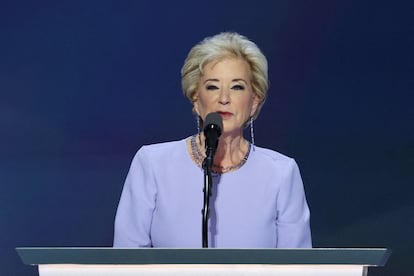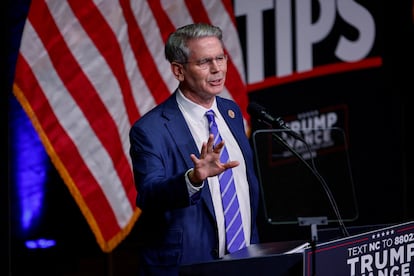Whenever there is talk about Donald Trump and his government of billionaires, all eyes immediately turn to Elon Musk, the richest man in the world thanks to his stakes in Tesla, SpaceX and the social media network X, among other companies that he owns. However, the Republican president has surrounded himself with other wealthy people in what The Economist has defined as one of the wealthiest administrations in history. Most of these individuals do not reach the sufficient scale to enter the exclusive Forbes list, but they do have important fortunes distributed in real estate properties, private and listed companies, currencies and cryptocurrencies. Some of these assets must be divested within 90 days of their appointment to avoid conflicts of interest, as stated in their asset declarations.
Secretary of Education Linda McMahon is one of the wealthiest Cabinet members. She is married to Vince McMahon, whose fortune Forbes estimates at $3.2 billion. Both grew their wealth with their investments in the World Wrestling Entertainment (WWE), back in the 1980s. Even today, it is still profitable: Linda McMahon, a former executive at the company, has declared that she owns more than $50 million in the listed TKO Group, the firm born from the merger in 2023 of WWE and UFC, the mixed martial arts league. It is one of the beneficiaries of the Trump effect on the stock market: TKO is up around 40% since his election victory, and is valued at almost $30 billion.

In addition, she holds shares in Ares Management, a venture capital company dedicated to lending in professional sports, with investments in soccer clubs such as Chelsea, Olympique Lyon and Inter Miami. It is listed on the stock exchange and is worth almost $60 billion. Outside wrestling and sports, another of her favorite investment products are the bonds launched by U.S. universities to finance themselves.
New Interior Secretary Doug Burgum owes his financial health to one transaction. In 2001, he sold Great Plans Software to Microsoft for $1.1 billion, and received his share in company stock, then valued at about $100 million, according to Forbes. He sold them and bought land in his home state of North Dakota, where he was governor, and in neighboring Montana. These were probably profitable real estate investments, but so would have been keeping all the Microsoft shares, which have appreciated by more than 1,200% in the 24 years since he received them.

His commitment to the technology sector has not waned: in his latest net worth statement, Burgum claims to own shares in Meta, Netflix, Apple, Alphabet and Adobe. And he also looks to sectors such as finance, with shares in JPMorgan and Visa, distribution (Costco), and medical technologies, in the company Stryker. To diversify some more, he invested in the VanEck Vectors Gold Miners ETF, and has interests in film production companies. Most of these positions are valued between $15,000 and $50,000, although he still owns Microsoft shares worth between one and five million dollars.
The Treasury Secretary, Scott Bessent, founder of the hedge fund Key Square Group, which had almost $600 million under management at the end of 2023, also fits into the category of billionaire. Among his assets, he declares owning between $1 million and $5 million in art and antiques, properties in the Bahamas, investment funds, ETFs linked to the S&P 500 and Nasdaq worth over $100 million, and bitcoin worth $250,000 to $500,000; he also holds more than $50 million in U.S. debt, and hundreds of millions in operations related to the evolution of the dollar against the euro, the yen or the yuan in the foreign exchange market. To these are added holdings in the unlisted pharmaceutical company Cambrian Biopharma, and in the also private Roxo Energy, which invests in energy, water and infrastructure. To avoid conflicts of interest, Bessent plans to leave his position in Key Square Group and sell his shares.

New Commerce Secretary Howard Lutnick’s Wall Street connections are extensive. The chairman and CEO of investment banking firm Cantor Fitzgerald has managed assets for the controversial cryptocurrency company Tether, which issues digital tokens pegged to the dollar. He has stakes of more than $50 million in the financial services firm BGC Group and in the real estate group Newmark holdings. After being appointed, he has pledged to sell his shares in Disney, where he owns a small stake of less than $15,000, as well as his $1 million-to-$5 million stake in Nasdaq which operates several U.S. exchanges.
The man responsible for implementing tariff policy in the Trump Administration has rebounded from the blow of the September 11, 2001 terrorist attacks. Cantor Fitzgerald occupied some of the highest floors of the North Tower at the World Trade Center, and the firm lost 658 of its 960 New York employees, including Lutnick’s brother. The financier set up a relief fund for the families of the victims.
The million-dollar investments of other recent Trump appointees are also public knowledge. Lori Chavez-DeRemer, Secretary of Labor, owns a stake worth between $1 million and $5 million in SJJD Consulting, a recreational cannabis manufacturer licensed to operate in Oregon, her home state. Pam Bondi, the attorney general, owns between $2 million and $10 million in stock and derivatives of Trump Media, the owner of the Truth Social platform. John Ratcliffe, director of the CIA, has invested in artificial intelligence, with interests in two unlisted companies, Latent AI and Shield AI, which works to enable drones and aircraft to operate autonomously without GPS, communications or pilots. He also has a stake in HyperX Logic, a microprocessor firm for cybersecurity and defense. And Health Secretary Robert Kennedy owns between $1 million and $5 million in bitcoin. Other investors in the main cryptocurrency include U.S. Vice President J.D. Vance, with between $250,000 and $500,000, and Tulsi Gabbard, Director of Intelligence, with between $30,000 and $100,000.
Sign up for our weekly newsletter to get more English-language news coverage from EL PAÍS USA Edition




